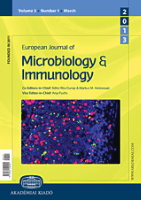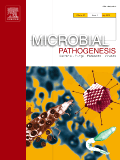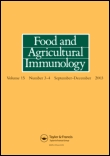
European Journal of Microbiology and Immunology
metrics 2024
Pioneering Research for a Healthier Tomorrow
Introduction
Welcome to the European Journal of Microbiology and Immunology, a premier platform dedicated to advancing the field of microbiology and immunology through the dissemination of high-quality research. Published by AKADEMIAI KIADO ZRT in Hungary, this journal serves as an essential resource for researchers, professionals, and students alike, fostering scholarly communication and innovation in these critical areas of medical science. The journal, which holds an ISSN of 2062-8633, presents rigorously peer-reviewed articles that contribute to our understanding of microbial diseases, immune responses, and related fields, currently ranking in the Q2 and Q3 quartiles across multiple categories such as immunology and microbiology. By embracing an inclusive scholarly dialogue and offering a robust readership, the European Journal of Microbiology and Immunology aims to inspire the next wave of discoveries and collaborations within the global scientific community.
Metrics 2024
 0.60
0.60 3.30
3.30 3.20
3.20 15
15Metrics History
Rank 2024
Scopus
IF (Web Of Science)
JCI (Web Of Science)
Quartile History
Similar Journals

Jundishapur Journal of Microbiology
Empowering scientists to unravel the mysteries of microbiology.Welcome to the Jundishapur Journal of Microbiology, a peer-reviewed publication dedicated to advancing the field of microbiology. Published by BRIEFLAND, this journal focuses on key areas such as infectious diseases and medical microbiology, offering a platform for researchers to share their findings from 2009 to 2024. Despite its current positioning in Quartile 4 across various categories in 2023, the journal provides a valuable resource for budding scientists and established professionals alike, contributing to the growing body of knowledge in these critical areas. While it is not an open-access journal, the Jundishapur Journal prioritizes the dissemination of research in the Netherlands, facilitating a deeper understanding of microbial science and its implications for public health. Join a community of innovators committed to exploring both emerging and established themes in microbiology.

Emerging Microbes & Infections
Transforming understanding of infectious challenges.Emerging Microbes & Infections is a premier open access journal, published by Taylor & Francis Ltd since 2012, dedicated to advancing the understanding of microbial infections and their implications in human health. With an impressive Q1 ranking across multiple categories—including Drug Discovery, Epidemiology, Immunology, and Infectious Diseases—this journal is at the forefront of research in the microbiological sciences. Covering a diverse range of topics, it serves as a vital resource for researchers, healthcare professionals, and students alike. The journal's commitment to open access ensures worldwide dissemination of cutting-edge findings, fostering collaboration and innovation in tackling challenges posed by emerging infections. As part of the thriving academic community in the United Kingdom, Emerging Microbes & Infections plays a crucial role in shaping the future of infectious disease research and public health.

INFECTION AND IMMUNITY
Unveiling Innovations in Microbiology and ImmunologyINFECTION AND IMMUNITY is a distinguished peer-reviewed journal published by the American Society for Microbiology, focusing on groundbreaking research in the fields of infection, immunology, microbiology, and parasitology. Established in 1971, this journal has built a robust legacy, converging years of scientific discovery with a vision towards 2024 and beyond. With an impressive Impact Factor, the journal holds significant rankings in various categories; its Q1 status in both Infectious Diseases and Parasitology underscores its high relevance and quality within the scientific community. Researchers and professionals alike will benefit from its content, as it promotes the latest advances in understanding immune responses and infectious agents, further legitimizing its place among the top quartiles of its respective fields. Access options are provided through traditional subscription models, ensuring a broad charitable dissemination of knowledge. As a pivotal resource for scholars and practitioners alike, INFECTION AND IMMUNITY stands at the forefront of microbiological and immunological research, fostering essential discourse that is crucial for advancing public health and scientific insight.

MICROBIAL PATHOGENESIS
Pioneering Research in Microbial PathogenesisMICROBIAL PATHOGENESIS, published by Academic Press Ltd - Elsevier Science Ltd, is a prominent journal in the fields of Infectious Diseases and Microbiology, with a notable impact factor and classified in the Q2 quartile for both categories as of 2023. Since its inception in 1986, this journal has provided a platform for the dissemination of cutting-edge research that enhances our understanding of microbial infections and their implications in health and disease. The journal is indexed in Scopus, ranking #80 among 344 in Infectious Diseases and #57 among 182 in Microbiology, underscoring its significant contribution to the scientific community. Although it operates under a traditional subscription model, the content is vital for researchers, professionals, and students focused on the dynamics of microbial pathogenesis and the development of innovative therapeutic strategies. The journal's comprehensive scope aims to foster advancements in this critical area of study, bridging the gap between laboratory research and clinical applications.

Frontiers in Cellular and Infection Microbiology
Leading the charge in microbiological excellence.Frontiers in Cellular and Infection Microbiology, published by FRONTIERS MEDIA SA, is a leading Open Access journal that has been at the forefront of microbiological research since 2011. Located in Switzerland, this journal aims to provide a platform for innovative and impactful studies in various domains including immunology, infectious diseases, and medical microbiology. With an impressive range of quartile rankings—Q1 in Infectious Diseases, Microbiology, and Microbiology (medical), and Q2 in Immunology—as of 2023, it positions itself as a highly reputable source in the academic community. Furthermore, its Scopus rankings highlight its significance within the respective fields, with top percentiles in key categories, making it an essential resource for researchers, professionals, and students alike. As an Open Access publication, it ensures that vital findings are accessible to a global audience, fostering collaboration and advancement in science.

Microbiology Spectrum
Bridging disciplines in the realm of microbiological studies.Microbiology Spectrum is a prominent peer-reviewed journal published by the American Society for Microbiology, dedicated to advancing the field of microbiology through the dissemination of high-quality research. Since its inception in 2013 and continuing until 2024, the journal has established a strong presence in key domains such as microbiology, immunology, cell biology, and ecology, achieving impressive quartile rankings including Q1 in Infectious Diseases and Q1 in Immunology and Microbiology as of 2023. With an emphasis on open access to its scholarly content, Microbiology Spectrum aims to foster collaboration and knowledge sharing among researchers, professionals, and students alike. The journal's scope encompasses a diverse range of topics pertinent to the field, making it an essential resource for anyone involved in microbiological research and its applications. Researchers looking to publish their findings in a respected journal will find Microbiology Spectrum's robust impact factor and Scopus rankings serve as testament to its significance and influence within the academic community.

Mediterranean Journal of Infection Microbes and Antimicrobials
Unlocking insights into the realm of infectious microbes.Mediterranean Journal of Infection Microbes and Antimicrobials is a distinguished open-access journal published by GALENOS PUBL HOUSE, dedicated to advancing the understanding of infectious diseases and microbiology. Since its inception in 2011, this journal has been a vital resource for researchers, professionals, and students interested in the intricate world of microbes and their impacts on human health. With its ISSN 2147-673X, the journal has progressively gained visibility, although it currently holds a Q4 ranking in multiple categories including Immunology and Microbiology, and Infectious Diseases for the year 2023. The journal operates from its headquarters in Istanbul, Turkey, and features a rich array of articles that contribute to the field’s body of knowledge. As a platform enhancing the accessibility of research, it invites submissions from global contributors to foster collaboration and innovation in tackling microbial challenges.

ACTA MICROBIOLOGICA ET IMMUNOLOGICA HUNGARICA
Fostering collaboration in infectious disease research.ACTA MICROBIOLOGICA ET IMMUNOLOGICA HUNGARICA is a distinguished academic journal published by AKADEMIAI KIADO ZRT, focusing on significant advancements in the fields of microbiology, immunology, and infectious diseases. Established in 1994, this journal serves as a vital platform for researchers, professionals, and students keen on exploring the complexities of microbial interactions and immune responses. With a current Impact Factor reflecting its rank within the Q3 categories for Immunology, Microbiology, and Infectious Diseases, it retains a critical position in disseminating innovative research. Although not open access, the journal provides extensive insights disseminated through various academic databases, ensuring a broad reach within the scholarly community. Its convergence over three decades indicates a robust commitment to excellence in scientific inquiry and knowledge sharing. As it moves towards the future, ACTA MICROBIOLOGICA ET IMMUNOLOGICA HUNGARICA continues to uphold its legacy of fostering collaborative research initiatives that contribute to the understanding and treatment of microbial diseases globally.

FOOD AND AGRICULTURAL IMMUNOLOGY
Enhancing Food Safety with Cutting-Edge ImmunologyFOOD AND AGRICULTURAL IMMUNOLOGY, published by Taylor & Francis Ltd, is a distinguished journal dedicated to the intersection of immunology and agricultural sciences, providing valuable insights in areas such as food safety, plant health, and disease resistance since its inception in 1989. Operating as an Open Access journal since 2017, it offers researchers and professionals unrestricted access to groundbreaking studies and reviews that advance the understanding of immunological responses in agricultural contexts. With its current quartile rankings of Q2 in Agronomy and Crop Science and Q3 in Food Science, as well as Q4 in Immunology, the journal has established itself as a vital resource for those aiming to enhance the quality and safety of food production through innovative research. By leveraging its impressive Scopus rankings across various categories, the journal promotes interdisciplinary collaboration and knowledge dissemination pertinent to both scientists and policymakers engaged in the agricultural and food sectors.

MEDICAL MICROBIOLOGY AND IMMUNOLOGY
Unveiling groundbreaking research in medical microbiology and immunology.Medical Microbiology and Immunology is a renowned journal published by Springer, serving as a pivotal resource in the fields of microbiology and immunology. Established in 1971 and continuing its legacy through 2024, this journal features cutting-edge research and reviews that address critical advancements and challenges within these dynamic fields. With an impressive impact factor and a robust ranking, including Q1 categories in both Microbiology (medical) and Immunology, it stands at the forefront of scholarly communication, ranking 21st out of 140 in the realm of Medical Microbiology. Researchers and professionals are encouraged to explore a variety of studies that delve into the interactions between microorganisms and the immune system, making it an essential resource for anyone fascinated by these interconnected realms of health sciences. Although not open access, the journal is widely accessible through institutional libraries, ensuring that significant findings reach a global audience. The University of New York Plaza serves as its operational hub in the USA, reinforcing its international influence and dedication to advancing knowledge in microbiology and immunology.